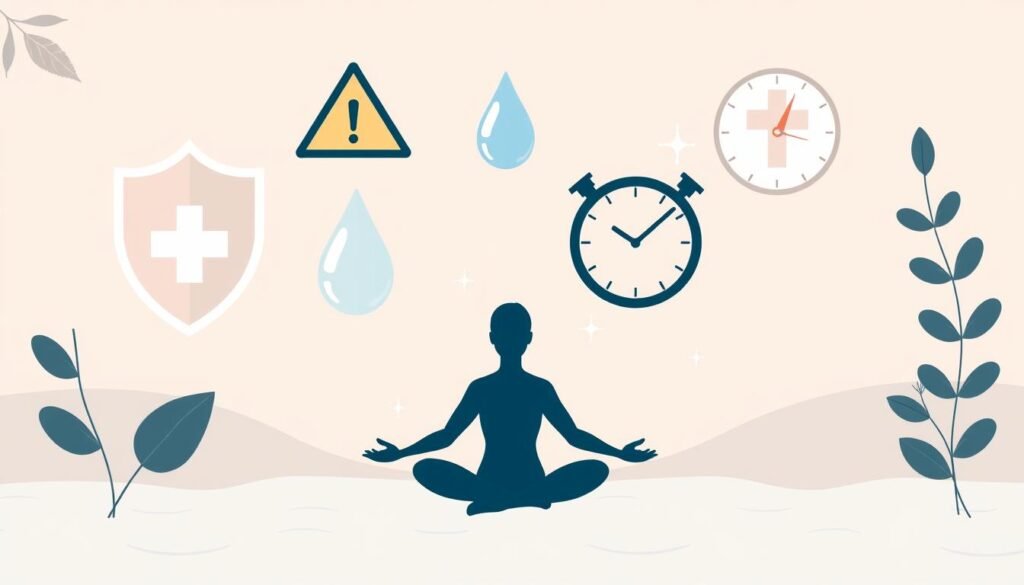About 19.1% of adults in the United States face anxiety each year. Knowing how to use medications like hydroxyzine is vital. It’s mainly an antihistamine, but it also helps with anxiety and tension for a short time. The right dosage is key to its effectiveness.
This guide details hydroxyzine dosage for anxiety, including its hydroxyzine anxiety dosage, how well it works, side effects, and safety tips. Knowing the hydroxyzine recommended dosage anxiety helps reduce anxiety safely and effectively. For more details on hydroxyzine dosage for anxiety, check out this treatment guide, which includes info for children and drug interactions.
Key Takeaways
- The recommended dosage for adults typically ranges from 50 to 100 mg, taken four times daily.
- Children aged 6 years and older may require 50 to 100 mg daily in divided doses.
- Hydroxyzine can also be used effectively for managing allergic reactions, with specific dosing guidelines.
- Short-term use is generally advised to avoid tolerance.
- Consult a healthcare professional for any severe side effects or dosage adjustments.
- Monitor for potential drug interactions, especially involving substances that increase sedation.
- Hydroxyzine is available in various forms, including tablets, capsules, and liquid, making it accessible for all patients.
Understanding Hydroxyzine and Its Uses
Hydroxyzine is an antihistamine used for several health issues. It’s known for reducing anxiety, treating allergies, and helping with sedation during medical procedures. It works by targeting certain body receptors.
What is Hydroxyzine?
Hydroxyzine comes in an oral tablet form and is for anyone over one year old. It’s great for easing anxiety and itching from allergies. It’s a generic medicine, making it a cost-effective option.
It’s important to store it safely to prevent accidental use by kids or pets.
How Hydroxyzine Affects Anxiety
Hydroxyzine calms by acting on histamine receptors. This action reduces anxiety and tension effectively. It can be taken several times daily as prescribed.
Users may experience dry mouth, dizziness, and tiredness. Always watch for serious side effects and talk to a doctor about them.
Hydroxyzine Dosage for Anxiety
Finding the right hydroxyzine dose for anxiety is key to managing it well. This antihistamine helps with anxiety because it calms the mind quickly. Doctors look at each patient’s needs and health before deciding on the dose.
Typical Dosage Recommendations for Adults
Adults usually take 50 mg to 100 mg of hydroxyzine for anxiety. They can take it up to four times a day. Taking 50 mg might reduce anxiety with fewer side effects. The highest amount an adult can take is 400 mg daily, but only with a doctor’s close watch.
Dosage Guidelines for Children
Hydroxyzine doses for kids are based on their age. Kids aged six and up can take 50 mg to 100 mg daily. This amount is split into two to four smaller doses. Kids younger than six should only take up to 50 mg a day, also in smaller doses. Parents must watch their children for any side effects.
| Age Group | Recommended Dosage for Anxiety (mg) | Dosage Frequency |
|---|---|---|
| Adults | 50 – 100 mg | Up to 4 times daily |
| Children (6 years and older) | 50 – 100 mg | Divided into 2 – 4 doses |
| Children (under 6 years) | 50 mg | Divided doses |

Forms of Hydroxyzine Available
Hydroxyzine comes in many forms to meet different needs. Patients with anxiety and other issues can find a form that works best for them. Knowing the options helps choose the right treatment.
Tablets and Capsules
Hydroxyzine is available in oral tablets and capsules. This makes it easy to take the right amount.
The strengths for hydroxyzine tablets for anxiety are:
| Form | Strengths |
|---|---|
| Tablets | 10 mg, 25 mg, 50 mg |
| Capsules | 25 mg, 50 mg, 100 mg |
Hydroxyzine capsules for treating anxiety come in various doses. This ensures both adults and kids get the correct dosage. The oral forms are widely used for different conditions. For anxiety, the dose can be spread out over the day.
Syrup and Injectable Form
Syrup form of hydroxyzine is great for kids or if you hate swallowing pills. The syrup has 10 mg of hydroxyzine in every 5 mL. This makes dosing easy. Sometimes, doctors use an injectable form, but it’s not as common as the oral types.

Safety Considerations Before Taking Hydroxyzine
Before starting hydroxyzine, think about its safety. It’s key to check for allergies, contraindications, and safety steps. This makes sure the medication works well and safely.
Allergies and Contraindications
It’s vital to test for any hydroxyzine allergies or past reactions to similar drugs. If there are severe allergies, you might need a different treatment. Also, some health issues could raise the risk of problems with hydroxyzine. This is especially true for QT prolongation, a serious heart issue.
Hydroxyzine isn’t good for people with QT prolongation risks. Or for those on certain antibiotics or mental health medicines.
Precautions for Special Populations
The elderly and kids need extra caution with hydroxyzine. Older people might get more side effects like drowsiness or confusion. They might need smaller doses. Kids might get excited instead of calm, so watch them closely.
Pregnant women should talk to a doctor first. They should weigh the risks and benefits. Breastfeeding moms must do the same.

| Population | Considerations |
|---|---|
| Elderly Patients | Higher sensitivity to side effects; dosage adjustments may be necessary. |
| Children | May show excitement instead of drowsiness; requires careful observation. |
| Pregnant Individuals | Use only if benefits outweigh risks, under medical advice. |
| Breastfeeding Individuals | Consult a healthcare professional before use. |
Knowing these safety tips for hydroxyzine helps make its use safer for anxiety or allergies.
How to Take Hydroxyzine Correctly
To use hydroxyzine effectively, understanding the correct method is key. One must always follow the advice of their healthcare professional regarding hydroxyzine. It’s important to take it with or without food. However, do not crush or chew the tablets.
Administration Tips
Key tips for hydroxyzine use include:
- Stick to the dosage your doctor prescribes.
- Take your medication at the same times every day to get the best results.
- Should side effects appear, immediately talk to your healthcare provider.
Knowing how to use hydroxyzine right can stop problems. For instance, be aware of overdose signs like too much sleepiness and confusion. Overdosing is serious and needs careful avoidance.
Managing Missed Doses
If you miss a dose of hydroxyzine, it’s important to handle it correctly. Take it as soon as you remember, unless it’s almost time for the next one. Then, just skip it and continue as normal. This avoids taking too much medicine.
For extra details, you can visit the hydroxyzine administration guidelines.
Potential Side Effects of Hydroxyzine
Those on hydroxyzine need to know about possible side effects. It’s vital to understand both common and severe impacts for health safety.
Common Side Effects
Most common side effects typically don’t need urgent care. They include:
- Drowsiness
- Dizziness
- Dry mouth
- Constipation
- Headaches
While common side effects are often manageable, it’s still smart to talk to a doctor if they don’t go away or if they get worse. This is very important for older adults and kids, as they can be more sensitive.
Serious Side Effects to Watch For
Serious side effects are different and need quick medical help. They include:
- Severe allergic reactions
- Significant heart rhythm changes (QT prolongation)
- Confusion or hallucinations
- Difficulties in breathing or worsening asthma
If you experience any of these, get emergency help. Those with heart issues or low potassium levels are at greater risk. Pregnant or nursing moms should speak to their doctor because hydroxyzine can affect breast milk.
| Type of Side Effect | Description | Urgency |
|---|---|---|
| Common | Drowsiness, dizziness, dry mouth, constipation, headaches | Usually not urgent |
| Serious | Severe allergic reactions, heart rhythm changes, confusion, breathing difficulties | Immediate attention required |
Understanding Hydroxyzine Interactions
Hydroxyzine is a common choice for treating anxiety and allergies. However, it can pose risks when mixed with certain substances. Knowing about hydroxyzine drug interactions is important for your health. Always talk to your doctors about any medicines, vitamins, and supplements you’re taking.
Drug Interactions to Be Aware Of
Several types of medications can have major interactions with hydroxyzine. These include:
- Antihistamines
- Sedatives
- Certain antidepressants
These drug mixtures can increase the chances of drowsiness and confusion. Research shows serious interactions with medications like amiodarone, citalopram, and fluoxetine. Keeping an eye on side effects and talking to your doctor about risks is key.
Impact of Alcohol and Other Substances
Using hydroxyzine and alcohol together can dangerously increase sedation. This can lead to breathing problems and poor coordination. It’s very important to avoid hydroxyzine and alcohol for your safety. People with conditions such as narrow-angle glaucoma or respiratory issues should be extra cautious.
Always coordinate with your healthcare provider about using hydroxyzine. It helps to fully understand the risk of interactions.
When to Consult Your Doctor
Knowing when to see a doctor about hydroxyzine is crucial. If anxiety doesn’t get better or worsens, it’s time to get help. Recognizing your body’s signals is key to improving your health.
Signs to Contact a Healthcare Professional
After starting hydroxyzine, watch for certain signs. Look out for unusual reactions like:
- Fainting
- Rapid or irregular heartbeat
- Strange skin reactions like rash or swelling
If you notice these, seek a hydroxyzine doctor consultation right away. Regular check-ups with a hydroxyzine healthcare professional help check if the treatment works and manage side effects.
If you feel extremely sleepy, sick, or notice mood changes, talk to a doctor. Knowing when to get medical advice is vital for safe treatment with hydroxyzine.
Conclusion
Hydroxyzine is a key player in treating anxiety, helping over a third of US adults. It’s FDA-approved and tackles more than just anxiety. It also soothes chronic itching from allergies and aids sleep before surgery.
Treatment with hydroxyzine is usually short, not more than four months. Dosages range from 50-100 mg up to four times a day. It’s vital to follow these guidelines to limit side effects like dry mouth, dizziness, and drowsiness. These effects highlight the importance of talking with doctors regularly.
If considering hydroxyzine for anxiety, speaking with a healthcare professional is crucial. They can customize the treatment to fit you best. For more information, check out this hydroxyzine medication guide. Smart management of treatment allows for relief from anxiety symptoms, using hydroxyzine both safely and effectively.